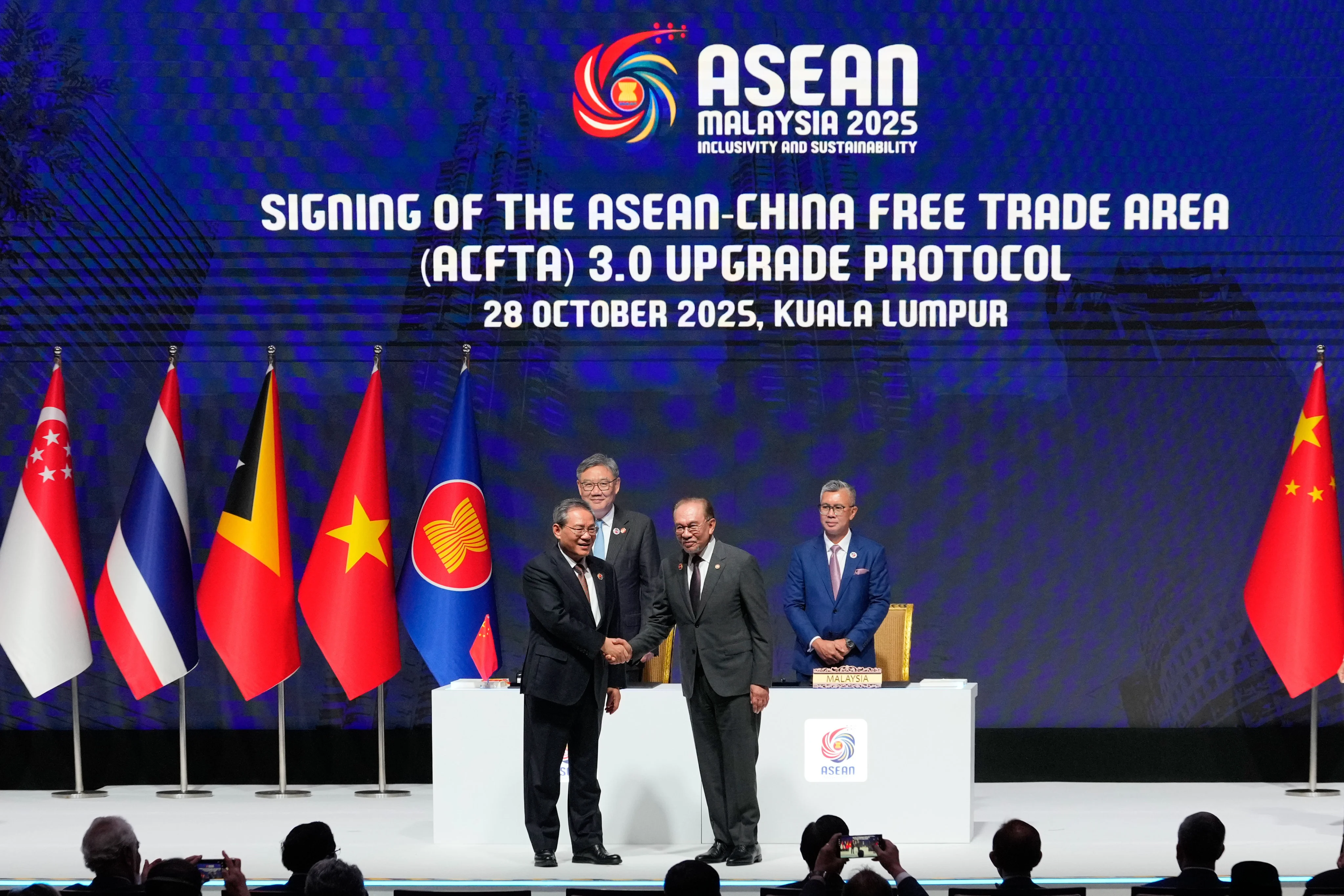Copyright scmp

China and a bloc of 11 Southeast Asian countries signed an upgrade to their free-trade agreement on Tuesday, expanding its terms to cover product quality, environmental protection and help for small businesses, in a sought-after strengthening of multilateral economic ties for Beijing amid its ongoing trade war with the US. The Association of Southeast Asian Nations (Asean), a group with a combined population of 680 million and a total gross domestic product of US$3.8 trillion in 2023, signed the China-Asean Free Trade Area 3.0 upgrade protocol at this week’s Asean Summit in Kuala Lumpur. Chinese Premier Li Qiang said the upgraded agreement creates new opportunities to expand and enhance bilateral economic and trade cooperation, while strengthening both sides’ capacity to withstand risks – particularly at a time “when many countries are facing greater development challenges after being unfairly subjected to steep tariffs.” Li made the comments at the 28th China-Asean Summit, held on Tuesday morning in the Malaysian capital as part of the larger summit. “As the rules-based international trading system is facing severe challenges, the signing of the protocol to upgrade the China-Asean Free Trade Area to version 3.0 carries great significance,” China’s Ministry of Commerce said in a statement on its website. The ministry added that the signing of the protocol “fully demonstrates China and Asean’s shared commitment to multilateralism and free trade,” and will “inject greater confidence and momentum into regional and global economic growth, serving as an important example for countries to jointly resist protectionism and unilateralism and to tackle global trade challenges together.” As its protracted trade dispute with the United States continues, China has taken steps to diversify its exports and deepen its economic ties with Asean - its largest trading partner by bloc and an increasingly wealthy manufacturing hub - as global supply chains shift. The commerce ministry said the upgrade means China and Asean will consider each other’s “standards” when developing technical regulations, and prioritise “standards cooperation” for electronic appliances and new-energy vehicles. The upgrade also includes support for the least developed countries in the agreement via “technical assistance”, per the ministry statement. The expansion encourages the promotion of e-commerce and greater awareness of intellectual property rights among smaller businesses. The deal also adds a host of environmental protection commitments on product financing, research, development and consumption of goods. Analysts said the upgrade helps China, the world’s second-largest economy, strengthen its position in Southeast Asia relative to the US after Washington reached deals with several Southeast Asian countries at the summit. Unified standards would ease any differences over the quality of imports or exports, said Jayant Menon, a senior fellow at the ISEAS-Yusof Ishak Institute in Singapore. For instance, provisions in the augmented deal related to rules on food and agriculture, Menon said, may be aimed at Southeast Asian fruits such as durians that occasionally fail Chinese import standards. Signatories to the agreement rejected the use of environmental standards as a “disguised form of trade protectionism” and consented to removing trade barriers related to environmental products and services, the ministry said. Previous versions of the agreement had eliminated most import tariffs on both sides. Analysts said the latest update was widely anticipated after the conclusion of China-Asean talks in May. “The Chinese government wants to be seen taking a stance in favour of multilateralism and free trade, in contrast to a unilateral and protectionist US,” said Christopher Beddor, deputy China research director with Gavekal Dragonomics. “Chinese officials have been fairly blunt about that message.” Washington announced deals this week on import tariffs and critical minerals with four Asean nations, including summit host Malaysia. “I think China would like to balance or respond to that,” said Siwage Dharma Negara, also a senior fellow with the ISEAS-Yusof Ishak Institute. Some Southeast Asian countries such as Indonesia had floated the idea of adding export dumping guidelines to the new agreement in case Chinese manufacturers turn to other Asian markets to ease excess capacity, Menon said. The ministry readout did not mention the issue of dumping as part of the updated deal. Manufacturers in Vietnam, meanwhile, are waiting to see whether the deal allows a freer flow of labour between their country and China, with which they share a land border, said Adam McCarty, chief economist with Mekong Economics in Hanoi. “Overall trade between Vietnam and China is very easy already,” McCarty said.



